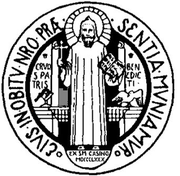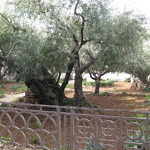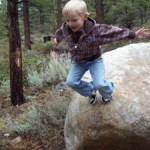 Question 1: What are you looking for? These are the first words spoken by Jesus in the Johannine gospel addressed to the disciples who begin to follow him. This question is addressed to each candidate before beginning the year-long formation for Oblates. What are your hopes, goals and desires as you embark on this adventure? How do you hope to grow in Christian discipleship? Why does this seem to be the right time for you to consider becoming an Oblate?
Question 1: What are you looking for? These are the first words spoken by Jesus in the Johannine gospel addressed to the disciples who begin to follow him. This question is addressed to each candidate before beginning the year-long formation for Oblates. What are your hopes, goals and desires as you embark on this adventure? How do you hope to grow in Christian discipleship? Why does this seem to be the right time for you to consider becoming an Oblate?
Mark O. Wilson (2012) is his book Filled Up, Poured Out speaks about the need for pastors not to become “clouds without rain” (p. 14). By this he means that pastors are to be present, like clouds in the sky, but not merely clouds for beauty’s or shade’s sake. We are the clouds God uses to bring refreshing rain, so that others may grow. However, even a storm cloud will eventually run out of rain if the moisture is not replenished. Like a cloud or pitcher of water, these things must be continually filled up, as their purpose is to be poured out for others (2 Timothy 2:2). As pastor of Oakdale Wesleyan Church I choose to be intentional about my own spiritual formation, with the same intentionality I have for the spiritual formation of my congregation. While I am certainly formed by my own preparation, be that in prayer, sermon preparation, or discipleship, sometimes in the busyness of life and weekly deadlines the temptation or reality arises for these meditative acts to become a pass-through in my life. I cannot function as a pastor or disciple of Christ, if my spiritual formation could be compared to a canal or filter; I must be fertile soil, which not only funnels and filters, but also absorbs and is a place of growth, Mark Wilson’s replenished cloud. In working towards becoming an Oblate, a year-long process, I will be adding an aspect of spiritual formation which cannot be immediately poured out.
I have two hopes as I embark on this adventure: a spiritual community and spiritual progress. Spiritual formation is not a solo act, but something done in community (Eph. 4:11-16). Although I have a community at Oakdale Wesleyan Church, under Christ I am also the leader of that community. While on the one hand a pastor is simply another one of the Good Shepherd’s sheep, the responsibilities the pastor hold, the boundaries members may put up between themselves and their pastor, and the depth of spiritual formation I desire as a Christian, may not always be available within my own congregation. In seminary, I was part of a cohort. We started seminary together, learned together, grew together, and mostly graduated together. Having that community, outside of our churches, with other people along the same journey was beneficial not only for our learning and completion of seminary, but also for our spiritual growth and encouragement through friendships. After seminary, I was invited to join a pastors’ coaching network, which mostly meets online. Again, I have found friendships and encouragement, as well as a place to encourage and share. I do not expect the oblate process to clone any of these communities, but to be a new community of believers living and learning alongside each other toward a common end. Just as I didn’t know how much the seminary cohort or pastors’ network communities would impact my life, so also I cannot say what impact the oblate candidate cohort would mean, but I hope it will be beneficial.
The second hope or desire is to see spiritual progress in my own life. Oakdale Wesleyan Church has set up 12 markers of spiritual growth that we call Living Stones (information can be found at http://oakdalechurch.org/living-stones). While the chief way of some mature believers, like myself, work through those milestones will be to teach others, I want to be working through them not only as a teacher, but as a student. The Oblate process will allow me to do this at least in the areas of spiritual disciplines and knowledge, if not others areas as well.
Hopes will likely never be achieved with specific goals. I have three goals, which I believe are in line with Scripture and Benedictine tradition and practice, I would work toward. The first, and most important, is I want to improve my prayer life (1 Thess. 5:17). I am defining this as having a prayer life like that of the prophet Daniel. His prayer life is marked with the following attributes:
- He prayed in community (Daniel 2:17-18)
- He prayed privately (Daniel 6:10)
- He prayed as a regular practice (Daniel 6:10-11)
- He fasted (Daniel 9:3)
- He listened and heard (Daniel 7-12)
- He prayed from Scripture (Daniel 9:1-3)
- He confessed both personally and corporately (Daniel 9:4-21)
- He made supplication (Daniel 9:17-23)
- He gave praise (Daniel 9:15-16)
- He prayed in simplicity (Daniel 10:2-3)
- He prayed to completion (Daniel 10:2-3)
- His prayer life along with his actions earned him the reputation of one who had the Spirit of God, wisdom, faith, and was righteous (Daniel 5:14-15; 6:4-5, 18-23)
I believe would align with a Benedictine view of prayer, as Joan Chittister (1993) describes in The Rule of Benedict: Insights for the Ages:
- “Prayer is to be prayer, not a glancing thought, not a shrug or gesture or a mindless moment of empty daydreaming. It is to be brief, yes. It is not, however, to be superficial.” (p. 86).
- “The prayers that pass our lips change our lives, so that God’s presence becomes palpable to us” (p 90).
- “Community prayer is central to the life” (p. 129).
- “Prayer in a Benedictine community is to be both regular and artistic” (p.131).
The second and third goals I am not weighting in terms of importance, but the second is working on my writing, both as art and spiritual formation, and the third is improving in ministering to the community. As writing is my artistic form of expression, I would learn to “practice [the] craft with all humility” (The Rule, chapter 57). This would specifically be applied to my work on my blog and in writing Living Stones into book form. Also, as an oblate I would seek to be an extension of St. Paul’s Monastery out in the surrounding community, just as I am an extension of Oakdale Wesleyan Church, both in hospitality (Heb. 13:2, The Rule, chapter 53) and engagement (John 17:13-19).
Becoming an Oblate is not simply connecting with the Benedictine tradition, but with a particular monastery. Earlier this year I was given an extended call by Oakdale Wesleyan Church, which means it is our intention to be here for the foreseeable future. Just as my family has become part of the local civic, service, and educational communities, it is also time for me to engage with the spiritual community at St. Paul’s Monastery. I am also at a time in my life and ministry where I can dedicate the time needed to complete the process. My formal education is completed (for now), my family life is stable, and church ministry is on course. Finally, as I mentioned Living Stones earlier, as our church is still developing this discipleship structure, I believe what I will learn through the oblate learning process will enhance our church discipleship, and from what I have studied thus far (more detailed in the third section of this application) Benedictine tradition aligns well with several aspects of the Wesleyan-Methodist tradition.
References
Benedict. The Rule of St. Benedict. Meisel, Anthony C. & del Mastro, M. L. translators (1975). Doubleday: New York, NY.
Chittister, Joan D., O.S.B. (1993). The Rule of Benedict: Insights for the Ages. The Crossroad Publishing Company: New York, NY.
Wilson, Mark O. (2012). Filled Up, Poured Out: How God’s Spirit Can Revive Your Passion and Purpose. Wesleyan Publishing House: Indianapolis, IN.







Look forward to joining you on this journey through prayerful support and then hearing what the Lord is doing in your heart and life.